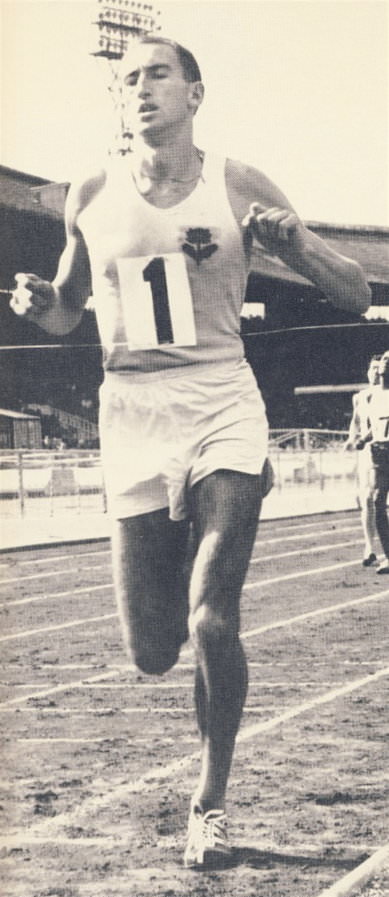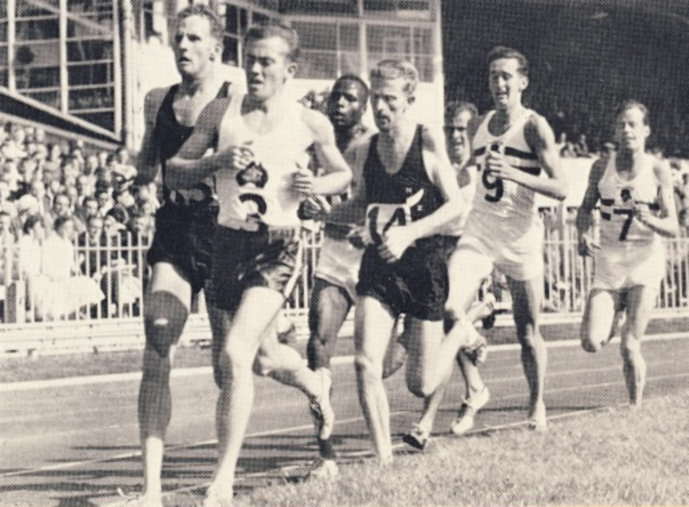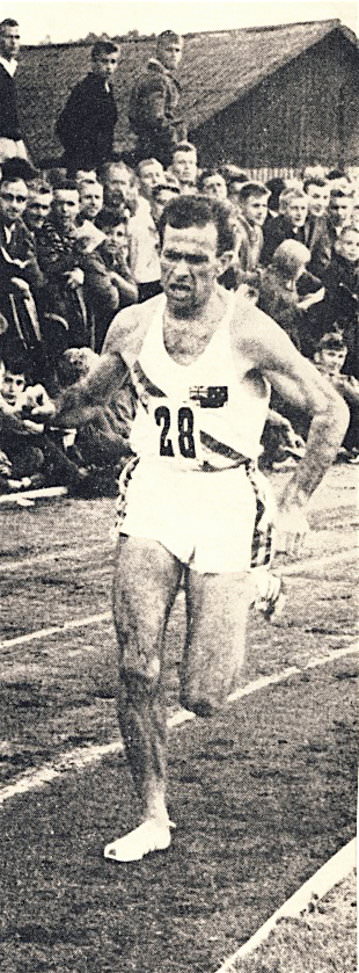EMPIRE GAMES
Cardiff, Wales, July 18-26, 1958.
On the new En Tout-Cas track in Cardiff, Australian and New Zealand runners dominated the distance events, winning all the races. Foremost was 20-year-old Elliott’s impressive 880-Mile double. But emerging longer distance runner Dave Power was almost as impressive in the Six Miles and Marathon. Then Murray Halberg showed that he had what it takes to win the big races, in this case the Three Miles. Also, worthy of mention is Albie Thomas, who was third in the Mile and second in the Three Miles—although he should perhaps have won the Three Miles, having recently set a 13:10 WR. UK athletes—Eldon, Pirie, Hewson—disappointed. But Merriman and Wilkinson ran well.
880
 |
| Herb Elliott won both 880 and Mile. |
Elliott was well aware that Hewson would be hard to beat. He had just suffered a resounding 880 defeat in the AAA Championships by both Hewson and Rawson. After his victory, Hewson was full of confidence: “….after my early season form I thought I was a cert for the gold medal. How wrong I was.” (Hewson, Flying Feet, p.89) With better half-mile speed, Hewson was hoping for a fast pace, but the field dawdled round the first lap in 58.8. At this point Elliott, to the surprise of everyone, took off for a sustained 400-yard burst to the tape. Hewson’s reaction to Elliott was not quick enough; he claimed he was “baulked.” (FF, p.89)
Going into the back straight he was five yards down on the Aussie. However, he gradually made up that deficit by the end of the straight. Holding onto Elliott round the last bend, Hewson thought he had the race in the bag. Elliott sensed Hewson on his shoulder and wondered whether he would sail past as he had done in the AAAs. But the back-straight effort to catch Elliott had taken the sting out of Hewson. Elliott held on to his slim advantage all the way to the tape. Elliott later said of Hewson: “He should never have allowed me to establish such a wide margin.” (Elliott, The Golden Mile, pp.86-7) The Times Athletics correspondent wrote that Hewson “ran like a novice.” (The Times, July 23, 1958) Elliott had used a surprise tactic to full effect; it was a courageous gamble to take off at the bell. For the record, Elliott’s second lap was 50.5 and Hewson’s an amazing 49.91.
1.Herb Elliott AUS 1:49.3; 2. Brian Hewson ENG 1:49.5; 3. Mike Rawson ENG 1:51.1; 4. Terry Sullivan ZIM 1:51.3; 5. Donal Smith NZL 1:51.5; 6. Mike Farrell ENG 1:52.1.
Mile
Neville Scott, who was advised not to run because of a chest infection, ran to help the field start well. He took the field through 440 in 61.3 but soon faded. Hewson then went into the lead. At 880 Elliott led in 2:03.2 with Lincoln on his tail. Pirie challenged Elliott on the third lap. “With Kuts as my model, I burned him off,” wrote Elliot later. (GM, p.87) By the bell (3:02.3), Elliott had a 12-yard lead on Pirie. He extended his lead on the last lap, while Lincoln and then Thomas passed Pirie. In this race, Elliott was in a class of his own.
1. Herb Elliott AUS 3:59.0; 2. Merv Lincoln AUS 4:01.9; 3. Albie Thomas AUS 4:02.7; 4. Gordon Pirie ENG 4:04.1; 5. Murray Halberg NZL 4:06.6; 6. Mike Berisford SCO 4:07.8; 7. Mike Blagrove ENG 4:08.0; 8. Brian Hewson ENG 4:11.1; 9. Neville Scott NZL 4:11.9.
Three Miles
 |
| Albie Thomas leads Scott and Halberg in the early going. Pirie (9) and Ibbotson (7) trail. |
Fresh from his 13:10.8 WR, Albie Thomas was the clear favorite in this race. Neither of the established stars, Pirie and Halberg, was in good form. Neville Scott of New Zealand was another possible medalist.
Thomas went straight to the front and stayed there for more than two miles. His laps were 64.7, 2:08, 3:12.6, 4:18, 5:25, 6:34. On the seventh lap, Thomas was almost tripped by a following runner. He sprinted out of trouble, but was soon caught again. He passed two miles in 8:55.6 with Scott, Halberg, Pirie, Power and Ibbotson all with him. On the ninth lap, the pace slowed. Halberg, as he had planned, took off and opened a 20-yard gap. “I ran to Thomas’s shoulder, steadied myself for a couple of strides, rocked back on my heels, and let go my sprint,” Halberg wrote in A Clean Pair of Heels. “As I went I sensed the surprise of the other runners. Neville Scott made an attempt to go with me but the plan was working perfectly. I was going away from them.” (Halberg, CPH, p.72)
Halberg did the next lap in 63.4 and reached he bell in 12:11.2. He finished in the third-fastest-ever time of 13:15.0, 70 yards ahead of Thomas, who sprinted past Scott round the last bend. “It was the easiest of wins because my break had caught them between moods,” wrote Halberg. (CPH, p.72) Pirie and Clark both ran PBs, although Pirie’s equivalent WR 5,000 time was over 20 seconds faster. A none-too-fit Ibbotson was a disappointing 11th.
1. Murray Halberg NZL 13:15.0; 2. Albie Thomas AUS 13:24.4; 3. Neville Scott NZL 13:26.2; 4. Gordon Pirie ENG 13:29.6; 5. Peter Clark ENG 13:30.6; 6. John Merriman WAL 13:32.2.
Six Miles
With his recent British Record of 28:05, Stan Eldon was the clear favorite. However, he was known to be susceptible to heat, so with the race being held in the hot afternoon sun, there was some concern about his chances. Other contenders were Hyman of England, Merriman of Wales and 30-year-old Dave Power, who was coached by Percy Cerutty but who had not had great competitive success.
Eldon went straight into the lead with 65.8, 2:15.1 and 4:34.9 at the mile. Behind him were Aussies Dave Power and Kenyans Anentia and Sum. Eldon tried a surge on the eighth lap and passed two miles in 9:15.6. On the ninth lap he relinquished the lead for the first time, to Martin Hyman, but soon regained it. But on the next lap he dropped back to fourth. Power led at three miles (14:14.6). At this point Eldon started to lose contact with the lead group, and despite a desperate sprint to regain contact on the 14th lap, he was done and would finish over 3:00 behind the winner.
 |
| Dave Power won two gold medals. |
The leaders--Power, Merriman, Anentia and Hyman--stayed together through four miles (19:05) and five miles (24:05). On the penultimate lap, Hyman was the first to drop. And then Onentia began to lose contact. At the bell it was a two-man race between Merriman and Power. And what a great race it was. Power held a slim advantage round the bend with Merriman on his heels. Merriman tried twice to get by, but each time Power held him off. Power finished one second ahead of the Welshman, running the last lap in 60.5. Both Anentia and Hyman finished in under 29:00. It was a stunning breakthrough for Power, who had been overshadowed in Australia by Stephens, Thomas and Lawrence.
1. Dave Power AUS 28:47.8; 2. John Merriman WAL 28:48.8; 3. Arere Anentia KEN 28:51.2; 4. Martin Hyman ENG 28:58.6; 5. Fred Norris ENG 29:44.0.
Marathon
This was a straightforward race, but it was exciting as the race for first place was always in question right up to the entry into the stadium. Dave Power, already the six-mile champion, took the lead at 12 miles. But at 20 his lead over South African Jan Barnard was only 10 yards. Barnard had finished third in the previous Empire Games Marathon in Vancouver. Power, however, never let the South African get on level terms, holding a 50-yard lead on entering the stadium and a twelve-second lead at the tape. Behind these two were three Englishmen and a Canadian; they clocked 1:56, 4:46, 5:57 and 6:32 behind the winner. None of them ever looked like winning the race.
1. Dave Power AUS 2:22:45.6; 2. Jan Barnard RSA 2:22:57.4; 3. Peter Wilkinson ENG 2:24:42. 0; 4. Eddie Kirkup ENG 2:27:32; 5. Gordon Dickson CAN 2:28:43; 6. Colin Kimball ENG 2:29:18. 
2 Comments